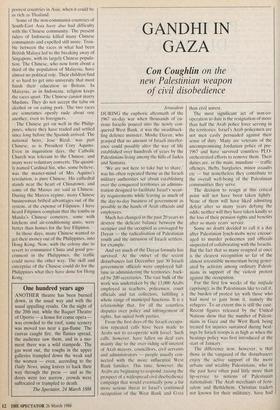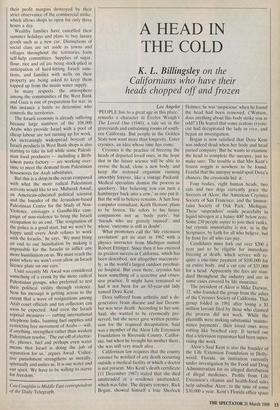GANDHI IN GAZA
Con Coughlin on the
new Palestinian weapon of civil disobedience
Jerusalem DURING the euphoric aftermath of the 1967 six-day war when thousands of cu-
rious Israelis poured into the newly con- quered West Bank, it was the swashbuck- ling' defence minister, Moshe Dayan, who grasped that no amount of Israeli interfer- ence could possibly alter the way of life established over hundreds of -years by the Palestinians living among the hills of Judea and Samaria.
We are not here to take but to share,' was his often repeated theme as the Israeli military authorities set about establishing over the conquered territories an adminis- tration designed to facilitate Israel's secur- ity requirements while leaving as much of the day-to-day business of government as possible in the hands of Arab officials and employees.
Much has changed in the past 20 years to destroy the delicate balance between the occupier and the occupied as envisaged by Dayan — the radicalisation of Palestinian youth and the intrusion of Israeli settlers, for example.
And yet much of the Dayan formula has survived. At the Outset of the recent disturbances last December just 30 Israeli government officials were employed full- time in administering the territories, hack- ed by 200 secretaries. The vast bulk of the work was undertaken by the 13,000 Arabs employed as teachers, policemen, court officials and tax collectors, fulfilling a whole range of municipal functions. It is a relationship that, for all the countless disputes over policy and infringement of rights, has suited both parties.
From the first days of the Israeli .occupa- tion repeated calls have been made to Arabs not to co-operate with Israel. Such calls, however, have fallen on deaf ears mainly due to the over-riding self-interest of Arab mayors, councillors. civil servants and administrators — people usually con- nected with the more influential West Bank families. ihiS time, however, the Arabs are beginning to respond, raising the prospect of a widespread civil disobedience 'campaign that would eventually pose a far more serious threat to Israel's continued occupation of the West Bank and Gaza than civil unrest.
The most significant act of non-co- operation to date is the resignation of more than half the Arab police force serving in the territories. Israel's Arab policemen are not men easily persuaded against their sense of duty. Many are veterans of the uncomproinising Jordanian police of pre- 1967 and have survived countless PLO- orchestrated efforts to remove them. Their duties are, in the main, mundane — traffic offences, thefts, burglaries, minor assaults etc but nonetheless they contribute to the overall well-being of the Palestinian communities they serve.
The decision to resign at this critical point will not have been taken lightly. None of them will have liked admitting defeat after so many years defying the odds; neither will they have taken kindly to the loss of their pension rights and benefits after so many years' service.
Some no doubt decided to call it a day after Palestinian lynch-mobs were encour- aged to murder policemen and officials suspected of collaborating with the Israelis. But the fact that so many resigned at once is the clearest recognition so far of the almost irresistible momentum being gener- ated by activists among ordinary Palesti- nians in support of the violent protest against the occupation.
For the first few weeks of the int/facia (uprising), as the Palestinians like to call it, the burden of protest lay with those who had most to gain from it, namely the refugees. To an extent this is still the case. Recent figures released by the United Nations show that the number of Palesti- nians in Gaza and the West Bank being treated for injuries sustained during beat- ings by Israeli troops is as high as when the beatings policy was first introduced at the start of January.
The difference now, however, is that those in the vanguard of the disturbances enjoy the active support of the more urbane and wealthy Palestinians, who in the past have often paid little more than lip-service to notions of Palestinian nationalism. The Arab merchants of Jeru- salem and Bethlehem. Christian traders not known for their militancy, have had their profit margins destroyed by their strict observance of the commercial strike, which allows shops to open for only three hours a day.
Wealthy families have cancelled their summer holidays and plans to buy luxury goods such as a new car. Distinctions of social class are set aside as towns and villages throughout the territories form self-help committees. Supplies of sugar, flour, rice and oil are being stock-piled in anticipation of hard-hitting Israeli sanc- tions, and familieS with wells on their property are being asked to keep them topped up from the mains water supply. In many respects, the atmosphere among the communities of the West Bank and Gaza is one of preparation for war, in this instance a battle to determine who controls the territories.
The Israeli economy is already suffering because large numbers of the 108,000 Arabs who provide Israel with a pool of cheap labour are not turning up for work. An increasingly widespread boycott of Israeli products in West Bank shops is also starting to take its toll white some Palesti- nian food producers — including a Beth- lehem pasta factory — are working over- time to meet the demand from Palestinian housewives for Arab substitutes.
But this is a drop in the ocean compared with what the more radical Palestinian activists would like to see. Mubarak Awad, an American-educated political scientist and the founder of the Jerusalem-based Palestinian Centre for the Study of Non- Violence, envisages a Gandhi-like cam- paign of non-violence to bring the Israeli occupation to an end. 'The resignation of the police is a good start, but we won't be happy until every Arab refuses to work with the Israelis,' he says. 'We must bring an end to our humiliation by making it impossible for the Israelis to inflict any more humiliation on us. We must reach the point where we won't even allow an Israeli licence plate on our cars.' Until recently Mr Awad was considered something of a crank by the more radical Palestinian groups, who preferred to test their political virility through violence. Now his message is getting across to the extent that a wave of resignations among Arab court officials and tax collectors can soon he expected. And even the Israeli reprisal measures — cutting international telephone links, banning fuel supplies and restricting free movement of Arabs — will, if anything, strengthen rather than weaken Palestinian resolve. 'The cut-off of electric- ity, phones, fuel and perhaps even water means that Israel is doing the job of separation for us,' argues Awad. 'Collec- tive punishment strengthens us morally, spiritually and unites us. It is our water and our spirit. We have to be willing to starve for freedom.'
Con Coughlin is Middle East correspondent of the Daily Telegraph.



















































 Previous page
Previous page